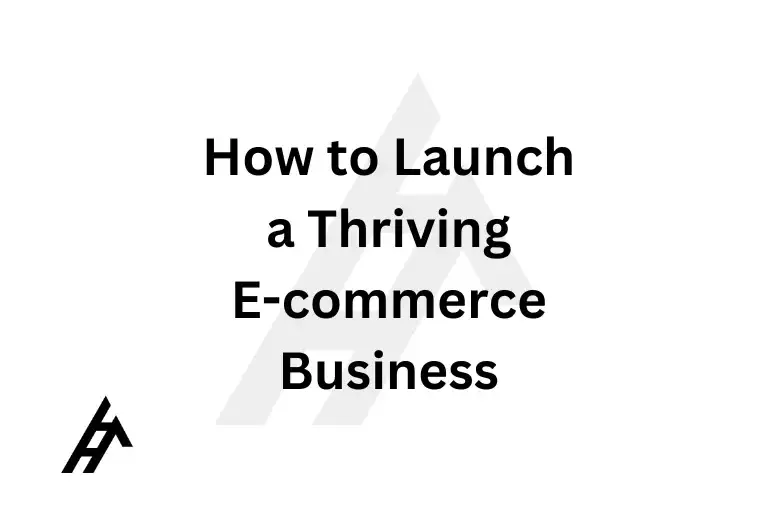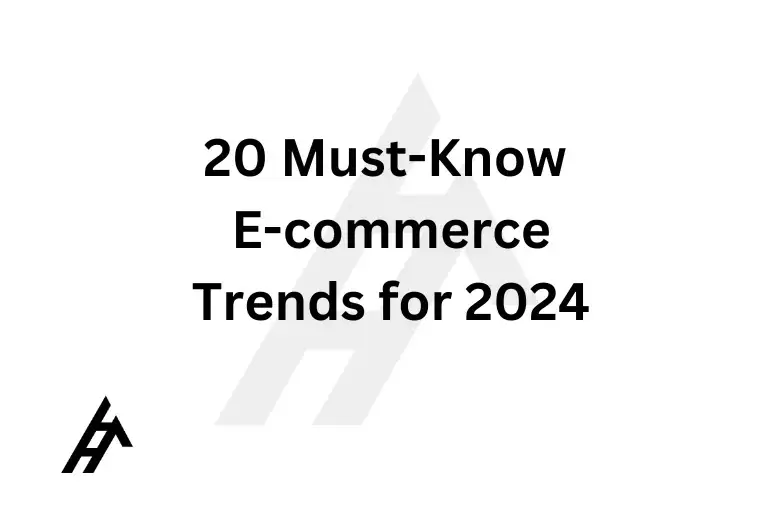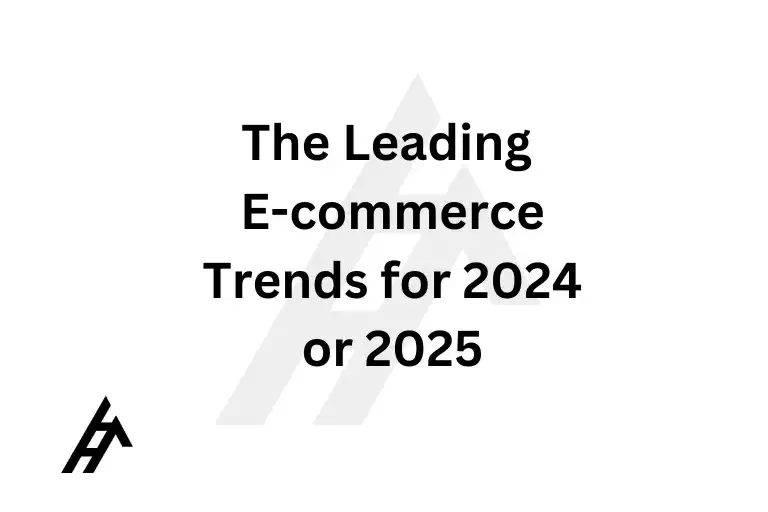Introduction.
This paper looks at how e-commerce has changed the shopping era and how this phenomenon is persistent. Given the increase in innovation in this industry and customer expectations the next five years will register improvements in this industry. Knowledge of these trends can help businesses keep abreast of the developments and capitalize on opportunities that are likely arise.
Emergence of Artificial Intelligence and Machine Learning.
E-commerce will experience future growth shaped high with artificial intelligence (AI), and machine learning (ML). These technologies allow for pick and choose tailored selling experiences, sales forecasts, and material handling. Real life customer service through the utilisation of conversational AI will improve ,which improves the users’ satisfaction level. Customers’ data will be analyzed through machine learning algorithms, to influence the choice of products and make customers loyal, and thus increasing the sales.
Further development of AR and VR technologies.
Specifically, augmented reality (AR) and virtual reality (VR) will become the norms in online shopping. AR brings the products into the customer’s environment while VR builds a whole shopping environment around the products. These technologies also help control the risk or the probability of a return for internet purchases, hence boosting customers’ reliability. There expect that more companies that sell through an online store will start to implement and use AR- and VR- technologies in the buying process.
Growth of Mobile Commerce.
Experts believe that leading position belong to mobile commerce or m-commerce in the sphere of e-commerce. Given that more consumer today are adopting the use of smart phones, more consumers will tend to shop using mobile phones. There is a need for mobile compatibility, here companies have to make sure that the websites are well optimized for mobile devices. Mobile pay and one click purchase are going to become norms and meet society’s need for the efficiency.
New Thinking on voice commerce.
Smart speaker and voice assistant aided shopping would increase owing to the up surging popularity of smart speakers and virtual assistants including Amazon Alexa and Google Assistant. Customers will rely more on vocal commerce in terms of products search and purchase, order tracking, and so on. It will be critical for the businesses to make their e-commerce platforms ready for voice searches and bears compatibility with voice apps.
Sustainability and Ethical Practices.
Thus, such aspects as sustainability and ethical practices will remain significant in the e-commerce field. Customers are now wise and mindful of their choices’ effects on the environment and society. So, the companies that focus on using green materials, environmentally-sound packaging, or clear and clean supply chains will appeal to the social buyers. The evidence of sustainability programs have established that communicating achievements in this area can improve its reputation and loyalty.
Personalized Shopping Experiences.
Customer individualisation will continue to be cornerstone in e-commerce business. Thanks to AI and big data, their shopping experiences will become uncompromisingly personalistic. In the area of product sales, it increases customer attraction through customized recommendations, advertisements among others. In the next five years, look for even more creative personalization techniques to meet the growing trend from the AI and data analytics.
Expansion of Subscription-Based Models.
Even now many business are adopting subscription base business model which will create more convenience for the consumer and continuous delivery of preferred goods and services. The advantage of this model is that, endeared businesses receive constant income and are able to maintain a lasting rapport with their clients. Services to be offered through subscriptions will increase, with the clients accessing everything from beauty products and clothing to groceries and cleaning products.
Omnichannel Retail Integration.
The distinction between online and offline trading will continue to fade, so omnichannel initiatives will remain relevant. Customers want a continuity of shopping experience from online shopping stores, physical stores and mobile applications. Consumers will expect perfect harmony in these channels and businesses will spend their money in making sure these are perfectly connected.
Advancements in Payment Technologies.
More efficient payment technologies shall be expected to be deployed to the market to enhance consumer friendly ways of paying for goods and services. The increase in the use of digital wallets, cryptocurrencies, and buy now, pay later (BNPL) services will be observed. MERCHANTS will have to learn about those methods and implement them for accepting the payments seamlessly in their online stores for smooth checkouts.
Rise of Social Commerce.
Thus, there is a growing trend of using social media as primary sales channels where consumers interact both socially and purchase products. Novelty aspects such as shoppable posts, Check Out in-app, and real-time streaming will define social commerce. In this case, the utilization of social media influencers and user-generated content will become critical techniques with which to relate and sell to the consumers.
Increased Security and Privacy of Data.
The instances of data breaches are increasing causing the consumers to put significant importance on the data security aspect. Security is an essential component for e-commerce organizations and consumers’ data must be well protected. In this respect, the regulations and legislation including GDPR and CCPA will go a long way in helping establishments and consumers alike in developing trust and confidence.
Blockchain Technology Integration.
Thus, the analyzed technology will penetrate into such as e-commerce allowing boosting the level of transparency, security and efficiency. The application of blockchain can be in checking the origin or legitimacy of the products, using it in supply chain, and in protecting the data of the customers. Due to this it has a decentralized form of operation, which makes it more secure to transact and suits the tech-savvy generation.
Automate in picking and packing.
It hold the promise of automating the flow of goods for fulfillment and delivering them in a quicker fashion. Automated guided vehicles, drones, and robotic vehicles will be used extensively in warehousing and in the delivery of products or goods. The use of these technologies will help bring down the operational costs and also help in quick delivery thereby serving the customers better.
Emphasis on Customer Experience.
The company’s focus on the customer is likely to persevere as one of the critical drivers of e-commerce initiatives. The companies will implement tools and processes that will improve all the areas of CI and CU. A user-friendly interface, ordering system, fast and relevant customer support – guaranteeing a great customer experience will remain the name of the game in terms of customer retention and sales.
Global E-commerce Expansion.
Contribution for e-commerce will steadily increase all over the world and intrude untapped markets among developing areas. There will also be a continuity of needs of various groups of consumers that organizations will have to address depending on their wants. Language support, localized marketing, and payment methods adapted for the target regions will play a significant role in this regard.
Use of internet of thing (IoT).
Thus, the Internet of Things (IoT) brings the concept of connected shopping closer by integrating even more into e-commerce. Appliances and such devices will be smart and make interaction with e-commerce platform and automatically reorder products and even recommend the products that customers prefer. For the internet shopping the IoT is going to become an increase in the degree of comfort and the service quality.
Leveraging Big Data Analytics.
It will also be observed that big data analytics will be playing a significant role in the advancement of e-commerce activities. Processing big amounts of consumers data will allow to identify the indicators of purchasing, tendencies in the market and consumers preferences. Organizations that properly implement big data will be in a better position to make sound decisions, manage their affairs well, and improve customers’ experience.
Emphasize on the Content Created by Users (CCU).
Use of consumer materials (CM) will remain important in influencing habits of purchase. Information being gotten from the customers such as their reviews, their experiences, and posts on various social platforms are persuasive. Promoting and utilizing UGC on e-commerce sites will be another effective tactic when it comes to attracting the attention of possible clients and increasing the rate of sales.
Dynamic Pricing Strategies.
Highly competitive pricing strategies or what is known as ‘dynamic’ price manipulation will be more apparent. The revised prices will be automatic due to the use of Algorithms and Artificial Intelligence, which will increase revenue and competitiveness. There will be a need to address the issue of price sensitivity among consumers, which the adaptation of price skimming strategies will require in business organizations.
Logistics and Supply Chain Management Improvement.
Among the areas, logistics and supply chain will be the key drivers of change founded on technology and innovation. Use of tracking in real time, predictive modeling, and use of block chain will enhance transparency, confidence and fast and accurate results. These advancements will guarantee delivery and operational expenses thus creating value, in the provision of improved goods and services, for businesses and consumers.
How Archaeo Agency Can Help.
At Archaeo Agency, we specialize in building high-performance websites designed to attract, engage, and convert. We understand the unique needs of realtors and create custom solutions that not only look stunning but also drive tangible results.
Get Your Professional Website in 24 Hours!
Is your website sending potential clients running? Contact Archaeo Agency today for a free website audit and let’s transform your online presence into a powerful lead generation tool.
Ready to give your website the upgrade it deserves? Contact Archaeo Agency today for a free consultation and let’s discuss how we can transform your online presence into a lead-generating powerhouse!
Conclusion.
E-commerce has a very promising future full of opportunities as well as challenges. This is because with the advancement in technology and change in clients’ shopping habits, organizations must adapt. By incorporating these key trends and predictions into their e-commerce businesses, online market ventures stand a better chance to prosper in the ever-increasing and intensely competitive market. Education and flexibility are going to matter greatly in society and e-commerce going forward.
FAQs.
- Therefore, what are the trends that define the outlook of the future for e-shopping?
- Such trends are AI and machine learning technologies, AR and VR technologies, mobile commerce, voice commerce technologies, the concept of sustainability, personalized buying, and subscription economy.
- What are the predictions of the guests as to how e-commerce will be affected by AI over the course of the next five years?
- AI will improve consumption and sales forecasting, supply chain and inventory monitoring, and the customer service function, all aimed at improving the efficiency of the shopping experience.
- Where and how will AR and VR find themselves to be useful and applicable in supporting eCommerce business?
- AR and VR will give a customers’ experience shopping experience where one can see how a product will look when placed in a real environment thus lowering the rate of returns.
- That is why mobile commerce plays a pivotal role in the development of e-commerce for the future.
- Given the increasing popularity of smartphones, pay particular attention to the MM category to satisfy consumers’ need for a convenient shopping experience.
- In what ways will social commerce impact on e-commerce?
- Social commerce will become integrated with the social interactions with regards to sales and marketing which will actively incorporate Instagram, the use of Facebook and influencer marketing will be used actively.
- What precautions should the business take when collecting, storing, and managing data?
- Thus, businesses should use effective security controls, follow the legislation requirements on data protection, and be transparent regarding the collection and use of consumer’s data.



